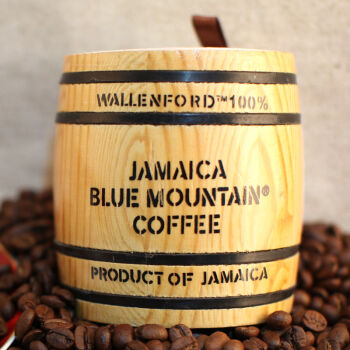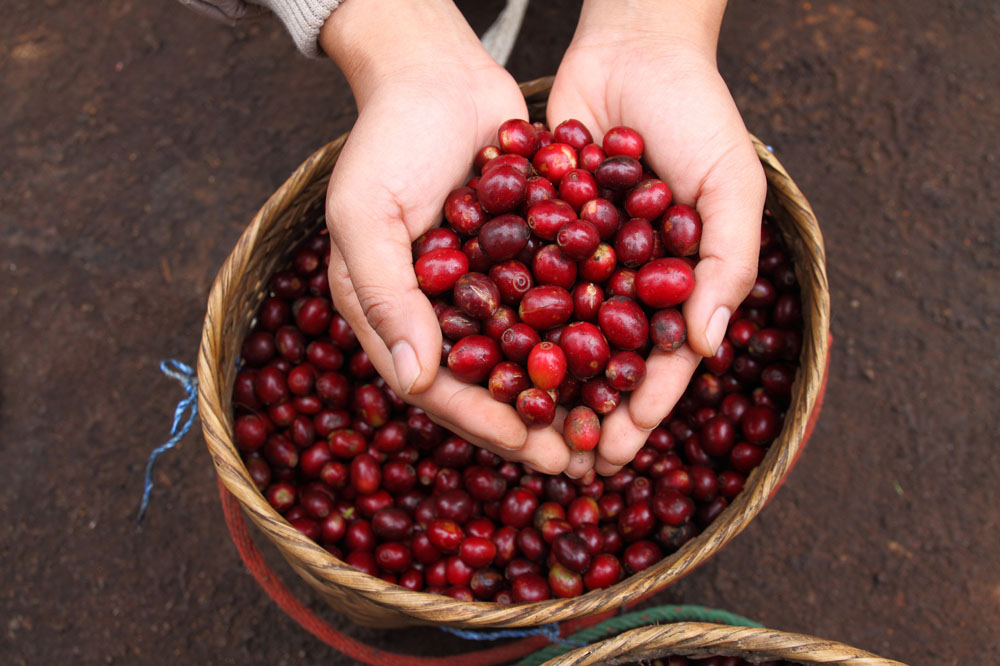Introduction of aromatic, full-bodied, fruity coffee manor producing areas in Kenya
Kenya's mineral deposits are mainly soda ash, salt, fluorite, limestone, barite, gold, silver, copper, aluminum, zinc, niobium and thorium, except soda ash and fluorite, most of which have not yet been developed. The main minerals are barite near Tamota in the southeast, niobium in the Mlima Mountains and gold from Kakamaga and Makajie in the southwest. Kyrgyzstan is one of the largest diatomite mines in the world, and Lake Magadi is rich in natural alkali and salt.
Forest resources
Kenya has a forest area of 87000 square kilometers, accounting for 15% of the land area. With forest reserves of 950 million tons, the Kenyan national emblem established in 1963 centers on a shuttle-shaped shield emblem consistent with the national flag, with a golden lion on each side, a spear on one limb and a shield emblem on the other. The white rooster with an axe in the back is the emblem of the African National Union of Kenya. According to the local tradition, the rooster symbolizes the new life. The two lions embody national sovereignty and national dignity, as well as the ties between Kenya and Britain. Under the feet of the two lions is the Kenyan volcano, the second largest mountain in Africa. It treads on fertile land, covered with coffee, oranges, sisal tea, corn and pineapple, and is full of fruit and fragrance. This is a microcosm of the peaceful life of the Kenyan people and the prosperity of the country. The brown ribbon under the national emblem is marked with the word "coexistence" in Swahili, expressing the aspirations of the Kenyan people for peace, fraternity, freedom and equality.
There is a famous equatorial snow mountain, Mount Kenya, on which grows a famous orchid, which is the national flower of modern Kenya-Kenyan orchid. The leaves of Kenshan orchid are wide and thick, like bands carved by the king of blue. The petite white flower consists of six oval petals. There is a charming little red dot in the center of the flower. On a long inflorescence composed of dozens of small flowers, neat red hearts and small white flowers are arranged on both sides, drooping slightly, showing the unique charm of Ken Shan Lan.
Kenyan coffee is mostly grown at an altitude of 1500m, 2100m, and is harvested twice a year. To ensure that only ripe berries are picked, people must tour the forest about seven times. Kenyan coffee is grown by small farmers. After they harvest the coffee, they first send the fresh coffee beans to the cooperative cleaning station. The washing station sends the dried coffee to the cooperative in the form of "parchment coffee beans" (that is, coffee beans covered with endocarp) to the cooperative ("parchment coffee beans" is the last state of coffee beans before peeling). All the coffee is collected together, and the growers charge the average price according to their actual quality. This method of buying and selling is generally working well, fair to growers and consumers, and some buyers, especially Japanese businessmen, have expressed dissatisfaction with the Kenyan coffee industry system. Some businessmen say that the quality of coffee in the country has declined, and point out that buying directly from farmers may be a way to improve the quality. But in any case, Kenya's detailed rules and regulations and sound procedures are a model worth learning from for all coffee-producing countries. It is fragrant, full-bodied, fruity and has a rich and perfect taste. Kenyan coffee has a wonderful fruit flavor, tastes like BlackBerry and grapefruit, and is a favorite of many coffee gluttons. This coffee has an excellent medium purity, crisp and refreshing taste. It has a fresh flavor and is most suitable for drinking iced coffee in summer. When tasting this coffee, if it is paired with sour fruits such as grapefruit, it will certainly give me the best coffee experience. "not much like coffee, but a bit like fruit tea" is the common feeling of many people about this kind of shallow roasted Kenyan coffee. In addition to having obvious and charming fruit acid, because Kenyan coffee is mostly from small coffee farmers, planted in a variety of different environments, encounter different climate and rainfall every year, and bring a variety of distinct and unique personalities

Important Notice :
前街咖啡 FrontStreet Coffee has moved to new addredd:
FrontStreet Coffee Address: 315,Donghua East Road,GuangZhou
Tel:020 38364473
- Prev

Casing Fermented Alcoholic Thick Civet Flavor, Character, Taste and Manor
Civet coffee (cat poop coffee), produced in Indonesia. It is one of the most expensive coffees in the world, with a price of several hundred dollars per pound. It is extracted from the feces of the civet cat and processed. The civet eats the ripe coffee fruit and passes it out of the digestive system. Due to the fermentation of the stomach, the coffee produced has a special taste and has become a competitor in the international market.
- Next

Sour aroma and taste Peruvian coffee flavor, characteristics, taste and manor
As a rising star in the coffee industry, Peruvian coffee is gradually opening up its popularity and entering the international market. Peruvian coffee has always been used as one of the stable and mellow mixed beans of comprehensive coffee. Peruvian coffee has a mellow taste and the right acidity, and this lukewarm coffee attitude has made more and more people like it. Peru is located in western South America, with a coastline of 2254 kilometers. Andes
Related
- Detailed explanation of Jadeite planting Land in Panamanian Jadeite Manor introduction to the grading system of Jadeite competitive bidding, Red bid, Green bid and Rose Summer
- Story of Coffee planting in Brenka region of Costa Rica Stonehenge Manor anaerobic heavy honey treatment of flavor mouth
- What's on the barrel of Blue Mountain Coffee beans?
- Can American coffee also pull flowers? How to use hot American style to pull out a good-looking pattern?
- Can you make a cold extract with coffee beans? What is the right proportion for cold-extracted coffee formula?
- Indonesian PWN Gold Mandrine Coffee Origin Features Flavor How to Chong? Mandolin coffee is American.
- A brief introduction to the flavor characteristics of Brazilian yellow bourbon coffee beans
- What is the effect of different water quality on the flavor of cold-extracted coffee? What kind of water is best for brewing coffee?
- Why do you think of Rose Summer whenever you mention Panamanian coffee?
- Introduction to the characteristics of authentic blue mountain coffee bean producing areas? What is the CIB Coffee Authority in Jamaica?

